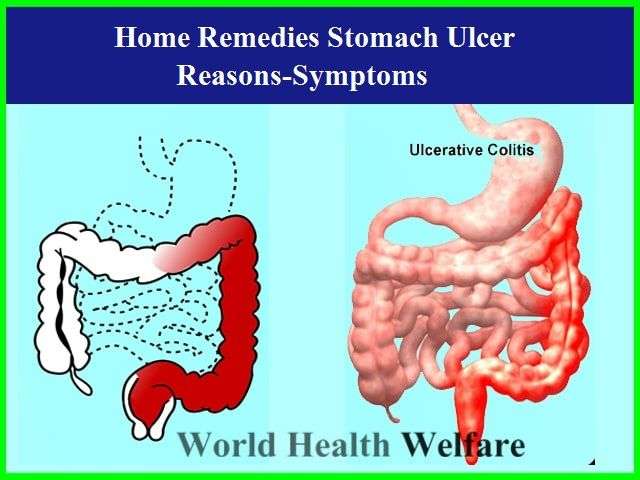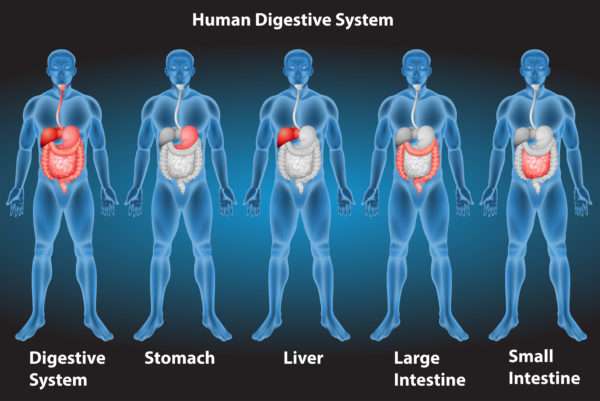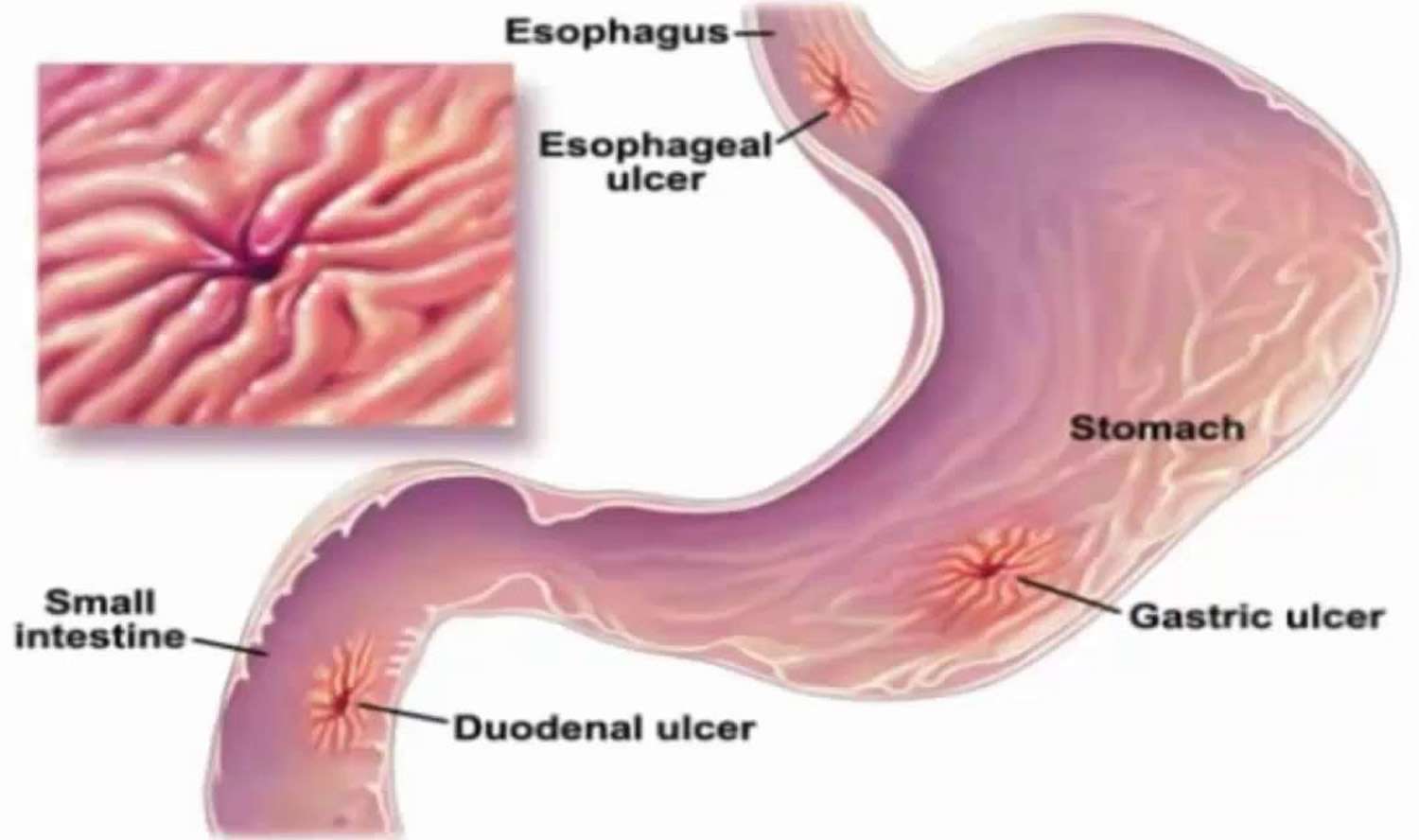Burning Pain In The Abdomen
Persistent burning pain in the abdomen is one of the first signs of a stomach ulcer. The sensation of pain occurs when juices in the stomach, which help in digestion, come into contact with an open sore in the stomach lining.
In most cases, the pain is felt from the breast bone to the navel, and it often worsens during the night. If you skip meals, particularly breakfast, you may also experience this burning sensation in the stomach during the daytime.
If the dull and burning ache of the ulcer often turns into a sharp, stabbing pain, it is a sign that your ulcer is acting up and you need medical help. It could mean that the ulcer has caused a more critical problem like a perforation in the wall of your stomach or intestine, or a blockage in your digestive tract, and it is triggering intense pain.
What Causes Stomach Ulcers
The two most common causes are:
- H. pylori infection. This common bacterial infection affects up to half of people worldwide. It primarily lives in the stomach. In many people, it doesnt seem to cause problems. Their gut immune systems keep it in check. But a portion of those infected have H. pylori overgrowth. The bacteria continue to multiply, eating into the stomach lining and causing chronic inflammation and peptic ulcer disease. H. pylori infection is associated with about 60% of duodenal ulcers and 40% of gastric ulcers.
- Overuse of NSAIDs. NSAID stands for non-steroidal anti-inflammatory drug.” These include common over-the-counter pain relief medications such as ibuprofen, naproxen and aspirin. NSAIDs contribute to ulcers in several ways. They irritate the stomach lining on contact and repress some of the chemicals that defend and repair the mucous lining. Up to 30% of people who take NSAIDs regularly develop peptic ulcers. Up to 50% of all peptic ulcers are caused by the overuse of NSAIDs.
Less common causes of stomach ulcers include:
- Zollinger-Ellison Syndrome. This is a rare condition that causes your stomach to produce too much gastric acid.
- Severe physiological stress. Severe illness, burns or injuries can produce stress ulcers in the stomach. Physiological stress changes your bodys PH balance, increasing stomach acid. Stress ulcers develop very quickly in response to stress, unlike normal stomach ulcers that develop gradually.
If Your Ulcer Was Caused By Helicobacter Pylori
Most stomach ulcers are caused by infection with H. pylori. Therefore, a main part of the treatment is to clear this infection. If this infection is not cleared, the ulcer is likely to return once you stop taking acid-suppressing medication. For more information, see the separate leaflet called Helicobacter Pylori.
Recommended Reading: What Foods Irritate An Ulcer
Treating Helicobacter Pylori Infection
If your stomach ulcer’s caused by a Helicobacter pylori bacterial infection, you’ll be given:
- a course of antibiotics
- a medication called a proton pump inhibitor
This is also recommended if it’s thought your stomach ulcer’s caused by a combination of an H. pylori infection and non-steroidal anti-inflammatory drugs .
Black Or Dark Colored Stool

If you think you may have an ulcer, a good way to tell is to look at your stool. If you notice that when you use the restroom your stool is extremely dark in color, or even black, chances are you are right about what is ailing you. If this is the case, you should absolutely go to the hospital immediately.
Also Check: Can You Get Ulcers In Your Intestines
You Have Heartburn At Most Meals
If you find yourself experiencing frequent heartburn, regardless of what you eat, an ulcer may be responsible. Many patients with ulcers describe feeling very intense chest pain, which often causes them to burp or hiccup more than usual after eating. In many cases, a simple over-the-counter antacid can be taken to temporarily alleviate some of the pain and gassiness, but if it persists day after day, its likely something more than a regular case of heartburn.
Youre More Bloated Than Usual
If you notice your stomach feeling particularly bloated, it may be more serious than a little bit of gasit could be one of the signs of an ulcer. According to RM Healthy, bloating is often one of the earliest ulcer symptoms, with patients especially complaining of pain in their midsection. Of course, bloating can also be caused simply by eating something your body doesnt agree with or not drinking enough water, but when combined with these other symptoms, its worth checking out.
Dont miss these home remedies for bloating.
You May Like: What Is A Gastric Ulcer And What Is Its Cause
How Do You Stop A Stomach Ulcer From Hurting
Home remedies and a healthy lifestyle
When Should I Call My Healthcare Provider
See your healthcare provider right away if you have any of these symptoms:
- Vomiting blood or dark material that looks like coffee grounds
- Extreme weakness or dizziness
- Blood in your stools
- Nausea or vomiting that doesnt get better, or gets worse
- A sudden, severe pain that may spread to your back
- Losing weight without even trying
Untreated peptic ulcers may cause other health problems. Sometimes they bleed. If they become too deep, they can break through your stomach.
Ulcers can also keep food from going through your stomach.
Also Check: What To Eat When You Have Ulcers And Acid Reflux
What Are Other Symptoms
However,see a doctor for accurate diagnosis since some signs and symptoms are quitevogue.
Forexamples, stomach ulcer may also cause vogue symptoms such as nausea,heartburn, bloating , or fatty foods intolerance. Evenabout almost 75 percent of patients dont have signs and symptoms, according toMayo Clinic. This suggests that many people probably dont realize the diseaseuntil it becomes quite advanced .
Besidesanalyzing signs and symptoms you have, several tests are required to diagnosestomach ulcer accurately. These may include :
Moreover,several medical conditions can cause symptoms similar to those of stomachulcer. Therefore doctors may also need to consider these issues. Some of theseconditions are gastritis, esophagitis, nonulcer dyspepsia, or gastric cancer.
Again,its important to follow your ulcer treatment comprehensively to boost a completecure more likely. Without proper treatment, it might turn into serious.
Lessoften, severe signs and symptoms of stomach ulcer may occur. Some of these areas follows:
Peptic Ulcers Are Often Symptomless
About 30 percent of 60 year olds with confirmed peptic ulcer disease have no abdominal pain.24 This means 1 in 3 old people without the slightest hint of the major symptom of peptic ulcers actually have them.
As if it was not already challenging to diagnose what cannot be seen, sometimes individuals suffering from peptic ulcers do not experience any symptoms.
Older people and children are, unfortunately, at a higher risk of belonging to this no-symptoms niche. This increases the likelihood of a delayed diagnosis and grave complications like perforation and internal bleeding.
Another group of individuals who may struggle with identifying peptic ulcers are those who are heavily dependent on NSAIDs. Even though abdominal pain is the most prominent indicator of peptic ulcers, such is not always the case. To our dismay, 1 in 3 people with peptic ulcers dont have any abdominal pain, particularly those popping NSAIDs.252627 This resonates with research findings that NSAIDs mask the symptoms of peptic ulcers.28 It is, thus, advisable to exercise caution if you need to regularly take these painkillers to treat other conditions.
Having no symptoms or weak symptoms, hence, does not rule out the possibility of peptic ulcers.
Recommended Reading: Prevention And Treatment Of Pressure Ulcers
Peptic Ulcer Facts And Picture
- Peptic ulcer are sores in the lining of the esophagus, stomach or duodenum.
- The main symptom of a stomach or duodenal ulcer is upper abdominal pain, which can be dull, sharp, or burning .
- Other associated symptoms may include:
- Acid reflux or heartburn
- Feeling satiated when eating
You May Like: What Can I Eat Upset Stomach
Diagnosis Of A Stomach Ulcer

Diagnosing a stomach ulcer is done using a range of methods, including:
- Endoscopy a thin flexible tube is threaded down the oesophagus into the stomach under light anaesthesia. The endoscope is fitted with a small camera so the physician can see if there is an ulcer.
- Barium meal a chalky liquid is drunk and an x-ray is performed, showing the stomach lining. These tests are less common nowadays, but may be useful where endoscopy is unavailable.
- Biopsy a small tissue sample is taken during an endoscopy and tested in a laboratory. This biopsy should always be done if a gastric ulcer is found.
- C14 breath test this checks for the presence of H. pylori. The bacteria convert urea into carbon dioxide. The test involves swallowing an amount of radioactive carbon and testing the air exhaled from the lungs. A non-radioactive test can be used for children and pregnant women.
Also Check: Best Treatment For Diabetic Foot Ulcer
Treatment For A Stomach Ulcer
Special diets are now known to have very little impact on the prevention or treatment of stomach ulcers. Treatment options can include:
- medication including antibiotics, to destroy the H. pylori colony, and drugs to help speed the healing process. Different drugs need to be used in combination some of the side effects can include diarrhoea and rashes. Resistance to some of these antibiotics is becoming more common
- subsequent breath tests used to make sure the H. pylori infection has been treated successfully
- changes to existing medication the doses of arthritis medication, aspirin or other anti-inflammatory medication can be altered slightly to reduce their contributing effects on the stomach ulcer.
- reducing acid tablets are available to reduce the acid content in the gastric juices
- lifestyle modifications including quitting cigarettes, since smoking reduces the natural defences in the stomach and impairs the healing process.
Read Also: Does Depression Cause Stomach Pain
What Is A Peptic Ulcer
A peptic ulcer is a break in the inner lining of the esophagus, stomach, or duodenum. A peptic ulcer of the stomach is called a gastric ulcer of the duodenum, a duodenal ulcer and of the esophagus, an esophageal ulcer. Peptic ulcers occur when the lining these organs is eroded by the acidic digestive juices that the cells of the lining secrete of the stomach secrete. A peptic ulcer differs from an erosion because it extends deeper into the lining and incites more of an inflammatory reaction from the tissues that are involved, occasionally with scaring. Peptic ulcer also is referred to as peptic ulcer disease.
Peptic ulcer disease is common, affecting millions of Americans yearly. Moreover, peptic ulcers are a recurrent problem even healed ulcers can recur unless treatment is directed at preventing their recurrence. The medical cost of treating peptic ulcer and its complications runs into billions of dollars annually. Recent medical advances have increased our understanding of ulcer formation. Improved and expanded treatment options now are available.
Don’t Miss: Foods Okay To Eat With An Ulcer
How Are Peptic Ulcers Treated
Treatment will depend on the type of ulcer you have. Your healthcare provider will create a care plan for you based on what is causing your ulcer.
Treatment can include making lifestyle changes, taking medicines, or in some cases having surgery.
Lifestyle changes may include:
- Not eating certain foods. Avoid any foods that make your symptoms worse.
- Quitting smoking. Smoking can keep your ulcer from healing. It is also linked to ulcers coming back after treatment.
- Limiting alcohol and caffeine. They can make your symptoms worse.
- Not using NSAIDs . These include aspirin and ibuprofen.
Medicines to treat ulcers may include:
- Antibiotics. These bacteria-fighting medicines are used to kill the H. pylori bacteria. Often a mix of antibiotics and other medicines is used to cure the ulcer and get rid of the infection.
- H2-blockers . These reduce the amount of acid your stomach makes by blocking the hormone histamine. Histamine helps to make acid.
- Proton pump inhibitors or PPIs. These lower stomach acid levels and protect the lining of your stomach and duodenum.
- Mucosal protective agents. These medicines protect the stomach’s mucus lining from acid damage so that it can heal.
- Antacids. These quickly weaken or neutralize stomach acid to ease your symptoms.
In most cases, medicines can heal ulcers quickly. Once the H. pylori bacteria is removed, most ulcers do not come back.
What Are The Complications Of Peptic Ulcers
Ulcers can cause serious problems if you dont get treatment.
The most common problems include:
- Bleeding. As an ulcer wears away the muscles of the stomach or duodenal wall, blood vessels may be hurt. This causes bleeding.
- Hole . Sometimes an ulcer makes a hole in the wall of your stomach or duodenum. When this happens, bacteria and partly digested food can get in. This causes infection and redness or swelling .
- Narrowing and blockage . Ulcers that are found where the duodenum joins the stomach can cause swelling and scarring. This can narrow or even block the opening to the duodenum. Food cant leave your stomach and go into your small intestine. This causes vomiting. You cant eat properly.
Also Check: Best Treatment For Stage 2 Pressure Ulcer
Poor Appetite And Inexplicable Weight Loss
Blockages caused by inflammatory scar tissue or swelling in the digestive tract may hinder free passage of food and cause you to feel full sooner.13 Even drinking fluids may require wilful effort.14
Recurrent vomiting may further deteriorate your health by depriving your body of block-building nutrients.
Signs You May Have A Peptic Ulcer
Peptic ulcers, or stomach ulcers, are breaks or holes in the lining of the stomach. An ulcer in the first part of the intestines is known as a duodenal ulcer. An ulcer in the stomach is known as a gastric ulcer. If you think you may have an ulcer, you should see a gastroenterologist. Gastroenterologists are specialists in the diagnosis and treatment of peptic ulcers. Here are 5 signs you may have a peptic ulcer. 1. Burning pain- The most common peptic ulcer symptom is a burning sensation or gnawing pain in the middle of your abdomen. The pain may come and go for several days or weeks. Even though discomfort may be mild, peptic ulcers can worsen if they arent treated. Taking antacids can relieve the discomfort, but it will keep coming back until the peptic ulcer is treated by a doctor.
2. Nausea- The symptoms of peptic ulcers may include nausea. Nausea is a feeling of sickness with an inclination to vomit. Nausea has many possible causes. Some common causes of nausea include appendicitis, infection, reactions to some medicines, migraines, food poisoning or intestinal blockage.
Also Check: What Is Best Medicine For Ulcer
Also Check: Herbal Medicine For Ulcerative Colitis
What Natural Home Remedies Help Peptic Ulcer Pain
Home care for peptic ulcers often centers on neutralizing the stomach acid.
- Dont smoke, and avoid coffee and alcohol. These habits increase gastric acid production and weaken the mucosal barrier of the GI tract promoting ulcer formation and slowing ulcer healing.
- Dont take aspirin or nonsteroidal anti-inflammatory medications. Acetaminophen is a good substitute for some conditions. If acetaminophen doesnt help, talk to your health-care professional about alternatives.
- If your symptoms are mild, try an over-the-counter antacid or nonprescription histamine blocker to neutralize stomach acid. Usually stronger prescription medications are needed.
Read Also: How To Get Rid Of Ulcers In Horses
What Are The Symptoms Of A Peptic Ulcer Does It Cause Pain

Ulcers do not always cause symptoms. Sometimes, a serious complication such as bleeding or a sudden, bad upper abdominal pain is the first sign of an ulcer.
The most common symptom of peptic ulcers is abdominal pain.
- The pain is usually in the upper middle part of the abdomen, above the belly button and below the breastbone.
- The ulcer pain can feel like burning, or gnawing, and it may go through to the back.
- Pain often comes several hours after a meal when the stomach is empty.
- The pain is often worse at night and early morning.
- It can last anywhere from a few minutes to several hours.
- The ulcer pain may be relieved by food, antacids, or vomiting.
Other symptoms of peptic ulcers include the following:
- Nausea
- Loss of appetite
- Loss of weight
Severe ulcers may cause bleeding in the stomach or duodenum. Bleeding is sometimes the only symptom of an ulcer. This bleeding can be fast or slow. Fast bleeding reveals itself in one of the following ways:
- Vomiting of blood or dark material that looks something like coffee grounds: This is an emergency and warrants an immediate visit to an emergency department.
- Blood in the stool or black, tarry, sticky-looking stools
Slow bleeding is often more difficult to detect, because it has no dramatic symptoms.
- The usual result is low blood cell count .
- The symptoms of anemia are tiredness , lack of energy , weakness, rapid heartbeat , and pale skin .
Read Also: Classic Features Of Ulcerative Colitis